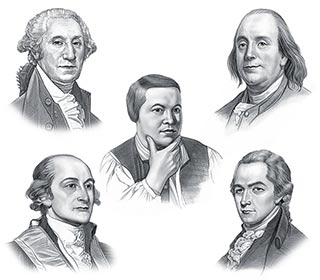Great Britain set about clearing the debt by taking various actions in the British Colonies following the Peace Treaty of Paris 1763. Additional taxes were levied on the American colonists, there were objections and dissension - the actions of Great Britain were leading America down the Road to Revolution.
Road to Revolution Begins
Great Britain issued the Proclamation of 1763thatwas designed to appease the Native Indians by halting the westward expansion by colonists whilst expanding the highly lucrative fur trade. The colonists in America believed that the British King had sided with the Native Americans, against the interests of the settlers. This is one of the first British actions that led the Americans to take the Road to Revolution and Independence from British rule.
The Road to Revolution & the Struggle for Independence
This overview describes many of these incidents that occurred on the Road to Revolution. Refer to Causes of the American Revolutionary Warfor a comprehensive article on this subject - we have detailed 38 separate causes of the War of Independence. The following chart details some of the major events that led the American colonists down the Road to Revolution.
The British had gained victory in the French and Indian Wars which had lasted for 75 years, the final conflict was the French Indian War from 1754 to 1763.
The British incurred a massive war debt and raise revenue from the American colonies to help reduce the debts.
The British decided to keep, and increase the standing army in America, and meet the costs of this by taxing the colonists and making them pay for the food and lodgings of the hated Redcoats
The British reversed its policy of Salutary Neglect enabling them to tighten their control in America and enforce the Navigation Acts and other laws that existed and imposing new taxes on goods
Great Britain then imposed new taxes on goods. The 1689 English Bill of Rights had put into place a constitutional form of government in which the rights and liberties of the individual were protected under English law. The Americans argued that they were not afforded the same rights.
The most notorious of the new taxes was the Stamp Act of 1765 which imposed taxes on legal papers, newspapers and pamphlets.
The colonists reacted violently and refused to pay the Stamp tax, and the British Parliament repealed it the following year. Refer to the Reaction to the Stamp Act
Violent opposition and the Reaction to the Stamp Act resulted in the British repealing the act in 1766
The American colonists denied the right of the British Parliament to tax them. Britain disagreed and determined to establish its right and authority over the American colonies passed the Townshend Acts that placed taxes on items imported by the colonists including glass, lead, paints, paper and tea
The American colonists refused to buy imported British goods, and
Parliament repealed all the Townshend duties except the tax on tea...
The American colonists reaction to the Tea Act was to boycott British goods. They would not order tea from London but the the East India Company was still allowed to send it. Five towns to which the tea was sent the tea back or destroyed it.
In 1773 Massachusetts patriots called the Sons of Liberty, dressed as Mohawk Indians, protesting against the British Tea Act and destroyed the tea loaded on ships in Boston Harbor. This act of defiance became known as the Boston Tea Party
The British Parliament responded by attempting to punish Massachusetts by passing a series of laws which the American called the Intolerable Acts.
The actions by the British led to the calling and the meeting of the First Continental Congress.
All of the 13 American colonies became united by the establishment of the Committees of Correspondence that communicated the dangers of 'taxation without representation' to all Americans
In accordance with one of the Intolerable Acts, General Gage became governor of Massachusetts in 1774
General Gage realized that the colonists were gathering stores and
cannon. He attempted to destroy the stores, and this brought on the Battle of Lexington and the Battle of Concord, which opened the American War for Independence.
The Road to Revolution had reached its destination.
